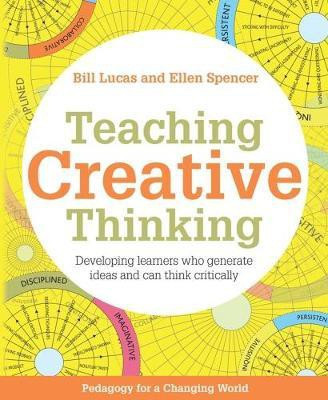Teaching Creative Thinking(English, Paperback, Lucas Bill)
Quick Overview
Product Price Comparison
Teaching Creative Thinking: Developing Learners Who Generate Ideas and Can Think Critically defines and demystifies the essence of creative thinking, and offers action-oriented and research-informed suggestions as to how it can best be developed in learners. Where once it was enough to know and do things, young people now need more than subject knowledge in order to thrive: they need capabilities. Teaching Creative Thinking is the first title in the three-part Pedagogy for a Changing World series, founded upon Lucas and Spencer's philosophy of dispositional teaching - a pedagogical approach which aims to cultivate in learners certain dispositions that evidence suggests are going to be valuable to them both at school and in later life. A key capability is creative thinking, and, in 2021, one of the guardians of global comparative standards, PISA, is recognising its importance by making creative thinking the `innovative assessment domain' to supplement their testing of 15-year-olds' core capabilities in English, maths and science. Creative thinkers are inquisitive, collaborative, imaginative, persistent and disciplined - and schools which foster these habits of mind in learners need to be creative in engaging children and young people by embedding creativity into their everyday educational experiences. In this extensive enquiry into the nature and nurture of creative thinking, the authors explore the effectiveness of various pedagogical approaches - including problem-based learning, growth mindset, playful experimentation and the classroom as a learning community - and provide a wealth of tried-and-tested classroom strategies that will boost learners' critical and creative thinking skills. The book is structured in an easy-to-access format, combining a comprehensive listing of practical ideas to stimulate lesson planning with expert guidance on integrating them into your practice, followed by plenty of inventive suggestions as to how learners' progress can be assessed and tracked along the way - by both the pupil and the teacher. The authors then go further to offer exemplars of success by presenting case studies of schools' innovations in adopting these approaches, and dedicate a chapter to dispelling any pressing doubts that teachers may have by exposing the potential pitfalls and offering advice on how to avoid them. Venturing beyond the classroom setting, Teaching Creative Thinking also delves into the ways in which a school can work towards the provision of co-curricular experiences - such as partnering with a range of external community groups - and better engage its leadership team and pupils' parents with the idea of creative thinking in order to support learners with opportunities to grow. The authors offer many examples which will inspire schools to do just this, and collate these ideas into building a framework for learning that equips young people in schools today with the twenty-first century skills and capabilities that will enable them to thrive in the workforce of tomorrow. Replete with research-led insight and ready-to-use strategies, Teaching Creative Thinking is a powerful call to action and a practical handbook for all teachers and leaders, in both primary and secondary settings, who want to embed a capabilities approach in their schools.


